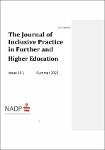Not hearing, not engaging, and not happening: Elusive Inclusive Higher Education,
| dc.contributor.author | Gibson, S | |
| dc.contributor.author | Williams-Brown, Z | |
| dc.contributor.author | Shute, J | |
| dc.contributor.author | Westander, M | |
| dc.date.accessioned | 2023-11-17T16:36:57Z | |
| dc.date.available | 2023-11-17T16:36:57Z | |
| dc.identifier.uri | https://pearl.plymouth.ac.uk/handle/10026.1/21664 | |
| dc.description.abstract |
This paper focuses on inclusive higher education in the United Kingdom. It details international literature, research studies and national reports, including findings from the authors’ study, ‘Working with disabled students to address unequal outcomes in UK HE during the pandemic’ where we critically explored inclusive practice in Higher Education (HE) and disabled students’ learning experiences. Our national study was carried out as a collaboration between the University of Plymouth, University of Wolverhampton, and Disabled Students UK (DSUK). Data collection took place in 2021 with an extensive literature-based investigation alongside the dissemination of a questionnaire to DSUK members resulting in 14 responses from across a variety of UG and PG programmes. This research took place whilst DSUK were completing a complementary national study asking disabled students about their experiences of Higher Education during lockdown periods, they received more than 300 responses. Alongside these studies, the Disabled Students’ Commission (DSC) (2021/2022) were compiling their annual report. Findings from our research corroborate the aforementioned investigations, contributing evidence that disabled students across undergraduate and postgraduate courses continue to experience perceived discriminatory and exclusionary practices (DSUK, 2020; NADP. 2020; NMHP, 2020). Findings from our research project ‘Working with disabled students to address unequal outcomes in UK HE during the pandemic’, will be explored in this paper and theysuggest too many disabled students studying in HE today, experience integration, which results in frustration, course transfers and failure, as opposed to the progressive and transformational learning that is associated with successful inclusion. The paper concludes by proposing HE policy makers and practitioners ‘partner-up’ with disabled students to reconsider what is understood, envisaged, implemented, experienced and evaluated as inclusive HE. Furthermore, that this collaboration and partnership is led by disabled students and takes place at both macro eg- Government, OfS and DSC) and micro levels (lecture theatre, online learning). | |
| dc.title | Not hearing, not engaging, and not happening: Elusive Inclusive Higher Education, | |
| dc.type | journal-article | |
| plymouth.publisher-url | https://nadp-uk.org/jipfhe-15-1-summer-2023-5/ | |
| plymouth.journal | The Journal of Inclusive Practice in Further and Higher Education | |
| plymouth.organisational-group | |Plymouth | |
| plymouth.organisational-group | |Plymouth|Faculty of Arts, Humanities and Business | |
| plymouth.organisational-group | |Plymouth|REF 2021 Researchers by UoA | |
| plymouth.organisational-group | |Plymouth|Users by role | |
| plymouth.organisational-group | |Plymouth|Users by role|Academics | |
| plymouth.organisational-group | |Plymouth|REF 2021 Researchers by UoA|UoA23 Education | |
| plymouth.organisational-group | |Plymouth|REF 2028 Researchers by UoA | |
| plymouth.organisational-group | |Plymouth|REF 2028 Researchers by UoA|UoA23 Education | |
| dcterms.dateAccepted | 2023-08-31 | |
| dc.date.updated | 2023-11-17T16:36:51Z | |
| dc.rights.embargodate | 2023-11-21 |


